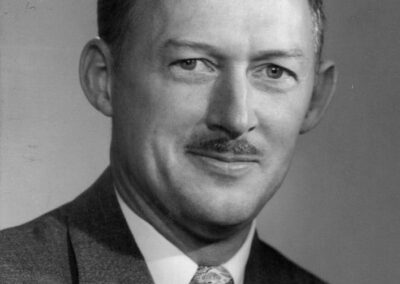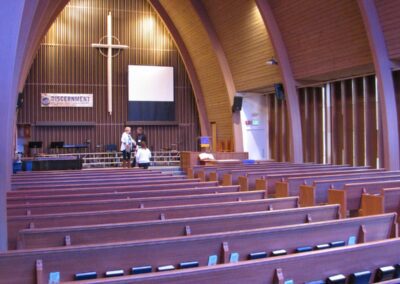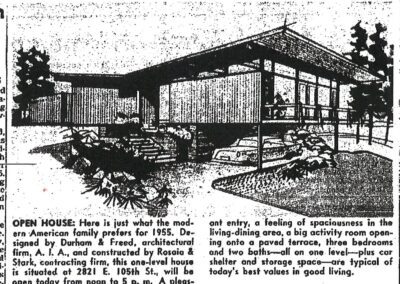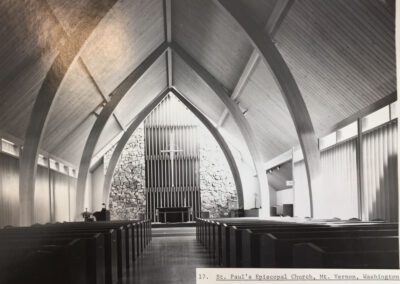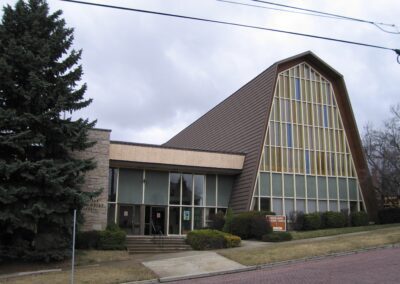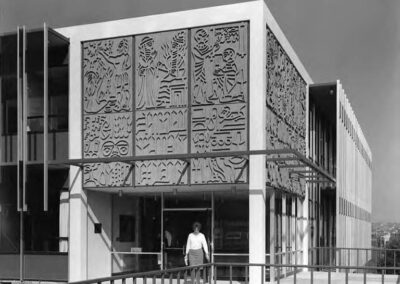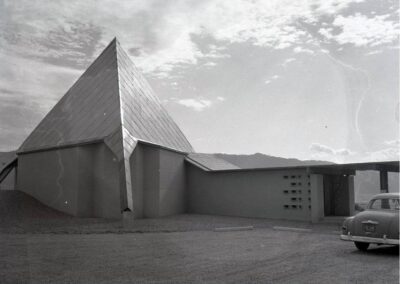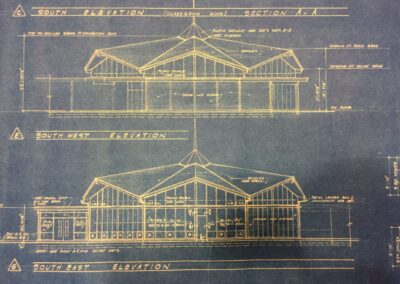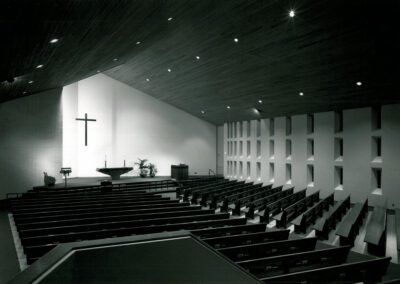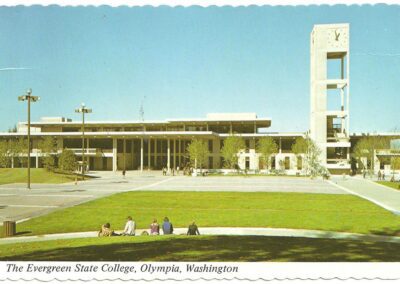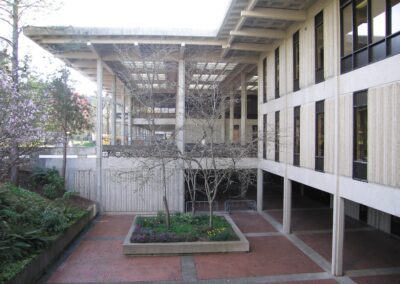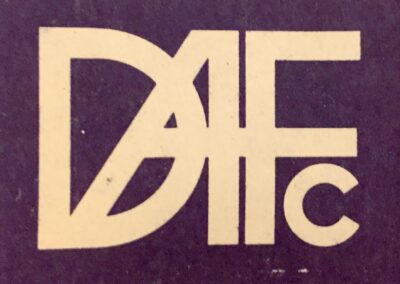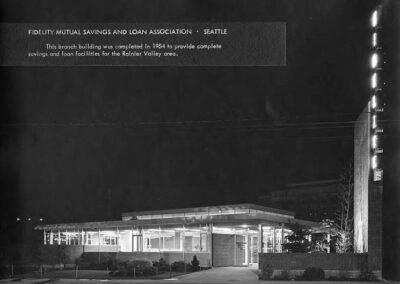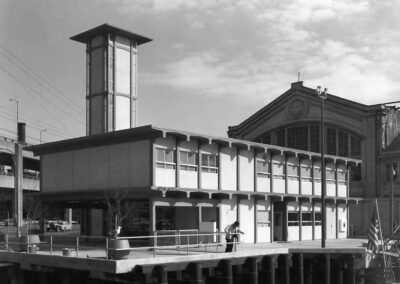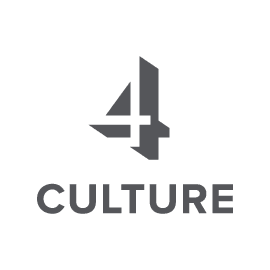
Durham, Robert L.
(1912 – 1998)
Robert L. Durham was born in Seattle on April 28, 1912, but was raised in Tacoma, graduating from Lincoln High School. After starting school at the College of Puget Sound, he transferred to the University of Washington and graduated cum laude from the School of Architecture in 1936. Upon graduation Durham joined Bertram Stuart as a draftsman. He then went on to work with the Federal Housing Administration in Okanogan County as a cost analyst. While there he designed several homes and commercial buildings in Omak and the surround areas.
Seeking to move back to the Seattle area, Durham spent three short months as a plans examiner for the Seattle Building Department before rejoining Stuart in a formal partnership in 1941. Durham was a talented young designer and a vocal proponent for modern design. He lectured frequently on the topic. Such stops on the lecture circuit included talks given to the Seattle Home Planners Institute on home design (1946); the Society of Residential Appraisers where he spoke on current problems in housing (1951); and for the University Women’s Club giving a lecture on “Architecture, A Tool for Modern Living” (1951). Durham also served on a panel for Seattle Master Builders discussing how to “Cut Standards of Waste and Save Standard of Living While Arming” (1951); and was invited to speak to the Engineers Club to discuss working relationship between architects and engineers (1952).
During the early part of his career, Durham was keenly interested in residential design and entered several design competitions. In 1943 he was named first prize winner in the “House of Tomorrow” competition sponsored by the AIA and Frederick & Nelson Co. and he also provided designs for Bon Marche’s “Salute to Northwest Homes” campaign (1947).
Under the name of Stuart & Durham projects include the Smith-Gandy Ford (1946) in Seattle; Rainier Poultry Co. Building (1951) in Seattle; All Saints Episcopal Church in Burien (1951); Associated of General Contractors (1950) on south slope of Queen Anne; Shorewood Heights on Mercer Island (1949); 200 units of housing for Lowe’s Terrace; Beverly Rae Apartments (1949); Queen Vista Apartments (1949); Laurel Crest Apartments (1950); and Laurelon Terrace Apartments (1949).
In 1951 Stuart and Durham parted ways. Stuart continued to practice into the late 1960s before passing away in Seattle in 1977. After a brief period as principal of his own firm, Durham formed a new partnership with fellow architect Aaron Freed in 1954. Architect David R. Anderson joined shortly thereafter and the firm was renamed Durham, Anderson & Freed.
After attending the North American Conference on Church Architecture in Columbus, Ohio in 1950, Durham began to specialize in church design. Between 1951 and 1975 his firm designed over 200 churches, many of which received considerable local and national attention. Among there notable projects was their design for the Fauntleroy Congregational Church, which received a National AIA Honor Award for Institutional Buildings in 1952; the First Methodist Church in Mount Vernon which also won in National AIA award in 1961; and the Highland Covenant Church of Bellevue which placed first in the 1964 Church Awards Competition of the National Association of Evangelicals. Other notable church designs include St. Elizabeth’s Episcopal (1956) in Burien; St James Presbyterian (1957) in Bellingham; the Congregational Ezra Bessaroth Synagogue (1969) in Columbia City; and the African inspired sanctuary at Mount Zion Baptist Church (1975) in Seattle.
The firm Durham, Anderson & Freed also designed a variety of schools, banks, residences, and other civic structures. Among their best known work is Seattle Fire Station No. 5 (1963), an all concrete structure with a 60 foot tower which received a citation in 1964 from the Prestressed Concrete Institute. Other projects include the Association of General Contractors’ (AGC) Seattle Headquarters Building (1965); SW Branch Seattle Library (1961); Atmospheric Sciences Building on the University of Washington campus (1970); Evergreen State College library (1971) in Olympia; the Horizon Retirement Home (1971) in Seattle; and the Main Library (1970) in Richland.
No stranger to civic involvement, Durham was very active within the architectural community both locally and nationally. A former president of the Seattle Chapter AIA, Durham went on to head the Washington State Chapter in 1954. As chairperson for Seattle’s Municipal Arts Commission, he was selected in 1961 to lead the Cultural Arts Advisory Board for the World’s Fair. The AIA College of Fellows inducted him in 1959, and in 1961 the AIA NW Region elected him to the national AIA Board of Directors. At the 1966 Convention in Denver, the national membership elected him First Vice President/President-elect, and in 1967-68 he served as the AIA 44th President – only the fourth West Coast architect to hold the highest elected office in the AIA’s. To date he is the only Pacific Northwesterner to have served as the National AIA President. Robert Durham served as Chancellor of the AIA College of Fellows in 1980, and in 1981 received the prestigious Edward Kemper Award for outstanding service to the Institute – becoming the only person to have served as President, Chancellor, and Kemper Award recipient in the AIA’s 141-year history. In 1985, he received the AIA Seattle Medal, the highest local honor to an architect, recognizing outstanding lifetime achievement.
Durham retired in 1977 and passed away on July 25, 1998. Previously in 1975, the firm was acquired by the Nebraska based Henningson, Durham & Richardson (HDR). HDR maintains a Seattle based office to this day.
Download PDF document to see a list of known Durham, Anderson & Freed projects. Download PDF (1.6M) »
– Michael C Houser
Seattle Pacific University – Library | Seattle
Built 1966 | Source: University of Washington Special Collections
